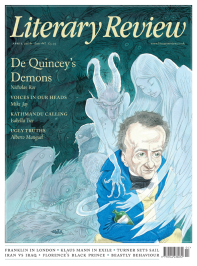Louise Wilkinson
Menus of the Middle Ages
The Culture of Food in England 1200–1500
By C M Woolgar
Yale University Press 341pp £30
The economic, religious and social importance of food in the Middle Ages is a subject that is attracting increasing attention from historians. It’s a reflection, perhaps, of our own society’s obsession with culinary experiences and the senses. In this meticulously researched study, Christopher Woolgar serves up a feast of information about food in medieval England. Drawing on a wealth of material, including household accounts, cookery books (more than four thousand medieval recipes survive to this day), literary works, miracle stories, monastic regulations, town ordinances, coroners’ rolls, and contemporary illustrations, architecture and objects, he explores both perceptions of food in the period from 1200 to 1500 and the manner in which foodstuffs were obtained, prepared and eaten. At the heart of Woolgar’s study is a highly compelling argument that food occupied a more significant, sophisticated and meaningful place in medieval culture than has often been recognised.
The book opens with a lively discussion of food cultures in the Middle Ages. This highlights the importance of food in the Christian calendar and religious practice; after all, two of the seven deadly sins – greed and gluttony – are connected to food. The late medieval Church strictly prohibited

Sign Up to our newsletter
Receive free articles, highlights from the archive, news, details of prizes, and much more.@Lit_Review
Follow Literary Review on Twitter
Twitter Feed
Under its longest-serving editor, Graydon Carter, Vanity Fair was that rare thing – a New York society magazine that published serious journalism.
@PeterPeteryork looks at what Carter got right.
Peter York - Deluxe Editions
Peter York: Deluxe Editions - When the Going Was Good: An Editor’s Adventures During the Last Golden Age of Magazines by Graydon Carter
literaryreview.co.uk
Henry James returned to America in 1904 with three objectives: to see his brother William, to deliver a series of lectures on Balzac, and to gather material for a pair of books about modern America.
Peter Rose follows James out west.
Peter Rose - The Restless Analyst
Peter Rose: The Restless Analyst - Henry James Comes Home: Rediscovering America in the Gilded Age by Peter Brooks...
literaryreview.co.uk
Vladimir Putin served his apprenticeship in the KGB toward the end of the Cold War, a period during which Western societies were infiltrated by so-called 'illegals'.
Piers Brendon examines how the culture of Soviet spycraft shaped his thinking.
Piers Brendon - Tinker, Tailor, Sleeper, Troll
Piers Brendon: Tinker, Tailor, Sleeper, Troll - The Illegals: Russia’s Most Audacious Spies and the Plot to Infiltrate the West by Shaun Walker
literaryreview.co.uk